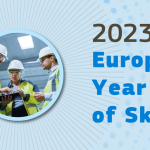Eurocadres takes part in the tripartite social summit

Following two years of work our conference concludes this re/up-skilling project.

Eurocadres outlines how the fund can enable a just recovery post-COVID in European Forum event.

Today Eurocadres members outlined the trade union’s vision for the future of work in Europe, during our 6th congress in Madrid, Spain.

The recently published ETUC/ETUI study, ‘Benchmarking Working Europe 2019’, reports that despite the rise in the number of highly skilled professionals, within the European Union (EU), there remains a gap between those highly-skilled workers and the number of appropriate jobs available to them.

The European Commission’s recently published ‘Study on the movement of skilled labour’ shows a significant increase in the share of high skilled EU movers. The proportion of high skilled EU movers amongst the employed population in the EU almost tripled to a total of 3.6 million, between 2004 and 2016.

The Commission is proposing for the member states to assess the necessity and balance of some regulated professions, that now sum up to 5 500 in total across the EU.

Eurocadres has been part of the joint work with ETUC on the response to the public consultation of the European Commission on the European Pillar of Social Rights. While supporting the common response the priorities are clear: up- & re-skilling, whistleblower protection and psychosocial health risks.

Launch event of the publication “In the Mirror of Competences” on a European glossary and a European competence framework for supervision and coaching held end of November 2017.

On new years eve the consultation of the European Commission on the European pillar of Social rights ends. Eurocadres has signed up on the campaign headed by ETUC to put Social Rights First! Sign your support for a social Europe on www.socialrightsfirst.eu.

A true novelty was introduced at the beginning of 2016 – the European Professional Card is available now for five professions (general care nurses, physiotherapists, pharmacists, real estate agents and mountain guides).

Eurocadres highlights in its reply that all workers, low- or high-skilled should have the opportunity to reskilling and upskilling.

Eurocadres will point out the importance of including highly-skilled professionals in the agenda.

Migrant EU workers are mostly highly educated and, in terms of qualifications, available evidence indicates that the key problem is the recognition of their professional qualifications. This is confirmed by a newly published study of the Commission.
An open European labour market needs Europe-wide recognition of diplomas which allows real opportunities and perspectives for professionals.
Eurocadres – the Council of European Professional and Managerial Staff – is satisfied that the European Commission has decided to prioritise jobs, growth and investment in its working programme.
A competitive Europe is built on a social Europe, where a well-educated workforce has a strong sense of security to take and make their own opportunities, using their skills. Where green jobs drive change to reach essential climate goals while making us leader in technology that needs to be in place for us to sustain life on this planet.


